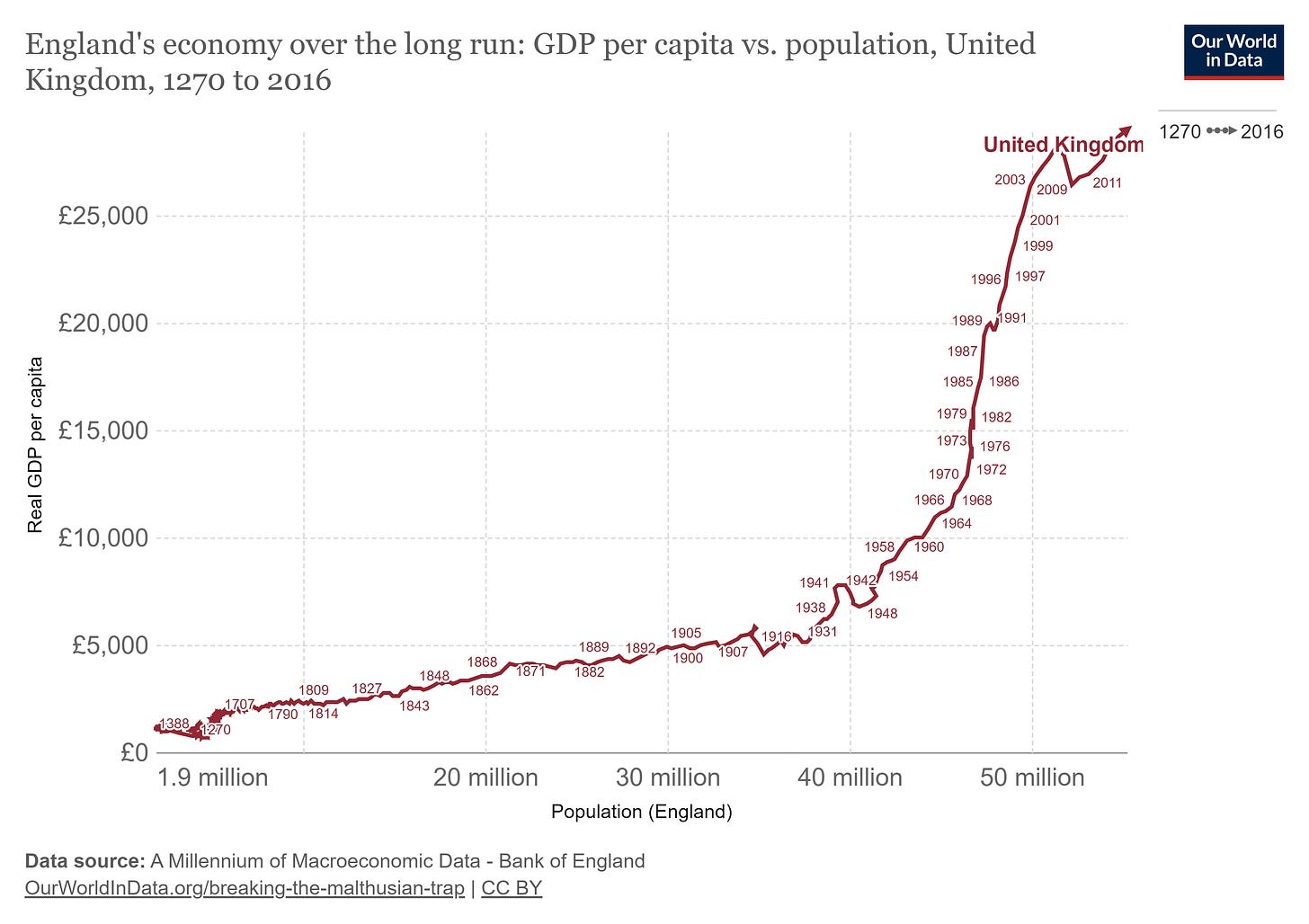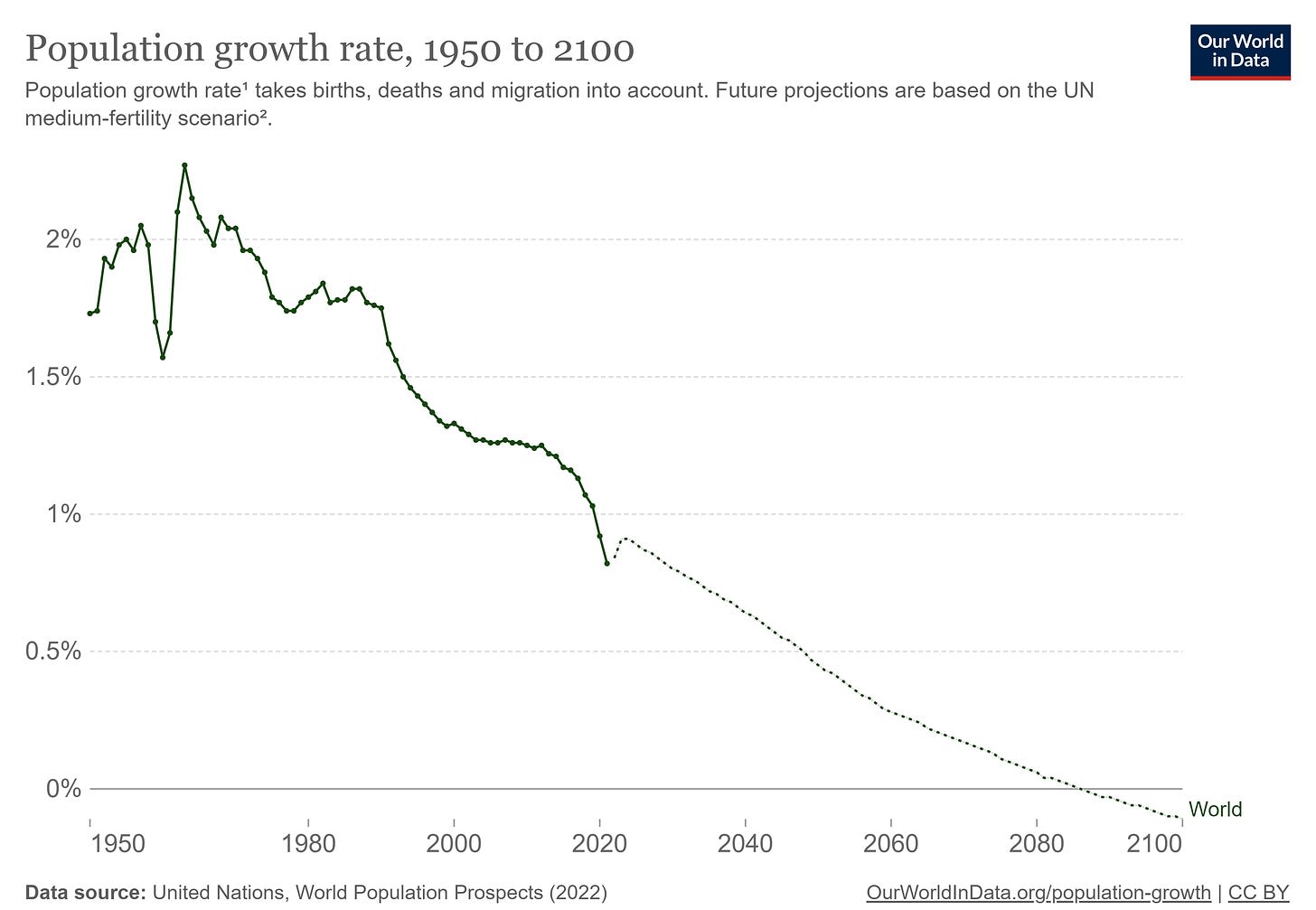Fertility as Metascience
By Maxwell Tabarrok @ 2023-11-25T15:41 (+15)
This is a linkpost to https://maximumprogress.substack.com/p/fertility-as-metascience
The most influential models of economic growth are all about people. These models predict that with a shrinking population, economic growth and technological progress stop and humanity stagnates into extinction. Metascience proposals focus mostly on improving the design of scientific institutions. This is surely important, but in the face of rapidly declining population growth rates it is like making a dam more efficient when the river is running dry.
Why Are People So Important?
Physical capital is subject to diminishing returns and depreciation which inevitably bring its impact on economic growth to zero. People, on the other hand, have increasing returns. As groups of people get larger, they can cooperate and specialize making the group more productive than the sum of its parts. But most importantly: People can share ideas.
When one person has an idea that makes them productive, it can be near-costlessly copied to all the other people in the economy, multiplying its effect. These increasing returns make people the driving force behind economic models of growth. There are important temporary sources of growth, like increasing education, research intensity, and labor force participation, but these are all changes to the percentage of your population that is devoted to discovering ideas and growing the economy. This percentage can only grow to 100 so the long run rate of growth is always constrained by the population growth rate.
Empirical Evidence
There is evidence that population is the fundamental input into economic growth and technological progress outside of theoretical models. There is the striking co-movement of population and per capita GDP over the long term.

Note that this is GDP per person so the direct increase in production that comes from adding an extra worker to the economy is not counted here, only the increases which come from raising worker’s productivity are shown.
This correlation is strong within countries and also across them. Michael Kremer finds that regions with larger starting populations several thousand years ago had faster technological change and population growth for the rest of their history. In general, an extremely simple model of a feedback loop between population and GDP per capita fits several thousand years of observed data so well that a Roman economist working for Julius Caesar with enough data on ancient Egypt could have accurately predicted world GDP and population today.
Worryingly, population growth rates are plummeting all around the world.

The decline has been more severe in rich countries at the frontier of growth. Population growth is already negative in Italy and Japan. Economic growth has been completely stagnant in Japan and Italy for about as long as they have had negative population growth rates. Economic growth in the US has been buttressed by increasing education and research intensity, but Chad Jones estimates that the US’ long run rate of growth is ~80% lower than the 2% per year average over the past several decades due to slow population growth rates.
But despite all of the importance that population growth is given in the foundational models of growth and the empirics, it doesn’t feature strongly in proposals to speed economic growth from metascience and progress studies.
One explanation for this is that raising fertility is just not tractable, so it makes sense to focus on other interventions which can be pushed over the finish line even if they aren’t the highest impact. This claim depends a lot on the political support for fertility interventions which I’m not too familiar with, but the data on existing fertility interventions suggest that certain policies can have large effects.
In 2014, the French government switched their child care rebates from a universal system to a means-tested system with sharp cutoffs at certain income levels. This study finds that the cutoff reduced births by 40% among the high income families in France! (I didn’t have time to fully vet this study and it seems like a huge effect from a relatively small intervention but there is a large literature on fertility interventions with varied but qualitatively similar conclusions).
There is lots of overlap between metascience and immigration reform which is probably the easiest way to increase birth rates, at least in the US, and comes with lots of other great benefits. But birth rates are falling globally, and for all the benefits that come from bringing immigrants to high-income countries, it will probably decrease their counterfactual birthrates. Reallocating people across the world is the right thing to do but it probably quickens the global demographic transition.
Metascience should take this prediction from the models of economic growth seriously: shrinking populations end growth. Long run growth rates are bounded by the growth rate of population, so if we want a world with rapid economic growth for the next several centuries, this is the binding constraint.
Karthik Tadepalli @ 2023-11-26T06:23 (+6)
I don't know what to do with this information. Have never seen a palatable fertility intervention!
Mo Putera @ 2023-11-26T19:27 (+3)
I'm a little surprised the author fixates on increasing fertility instead of digital people.
Like any software, digital people could be instantly and accurately copied. The Duplicator argues that the ability to "copy people" could lead to rapidly accelerating economic growth: "Over the last 100 years or so, the economy has doubled in size every few decades. With a Duplicator, it could double in size every year or month, on its way to hitting the limits."
Digital people could create a more dramatic effect than this, because of their ability to be sped up (perhaps by thousands or millions of times)3 as well as slowed down (to save on costs). This could further increase both speed and coordinating ability.4
Another factor that could increase productivity: "Temporary" digital people could complete a task and then retire to a nice virtual life, while running very slowly (and cheaply).5 This could make some digital people comfortable copying themselves for temporary purposes. Digital people could, for example, copy themselves hundreds of times to try different approaches to figuring out a problem or gaining a skill, then keep only the most successful version and make many copies of that version.
This is all the usual Age of Em stuff (see also Scott's review).
Karthik Tadepalli @ 2023-11-26T19:41 (+4)
The more realistic version of this argument uses AI in place of digital people, which is certainly a possibility. But it's still... put gently... not very grounded.
Vasco Grilo @ 2024-01-03T21:56 (+4)
Nice post, Maxwell! For reference, Charlotte Siegmann and Luis Mota have assessed the case for population growth as a priority:
Overall, while we think that increasing population growth rates is positive, the scale of its benefits appears to be orders of magnitude smaller than those of top cause areas.
SummaryBot @ 2023-11-27T13:18 (+1)
Executive summary: Economic growth models show population growth drives technological progress and GDP per capita, so declining fertility rates threaten long-run growth and should be a top priority for metascience.
Key points:
- People enable cooperation, specialization, and idea sharing that powers economic growth not explainable by capital or labor alone.
- Historical and cross-country data confirms population size and growth strongly predict technological change and GDP per capita over long periods.
- Global fertility rates are plummeting, slowing growth in developed countries already and threatening long-term stagnation.
- Some government policies sharply affect fertility, so viable interventions may exist to raise it.
- Immigration can temporarily substitute for fertility but still quickens the global demographic transition.
- Metascience should prioritize raising fertility given its first-order importance for long-run growth in leading economic models.
This comment was auto-generated by the EA Forum Team. Feel free to point out issues with this summary by replying to the comment, and contact us if you have feedback.